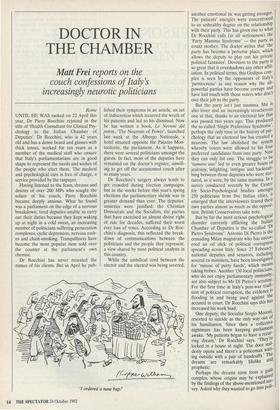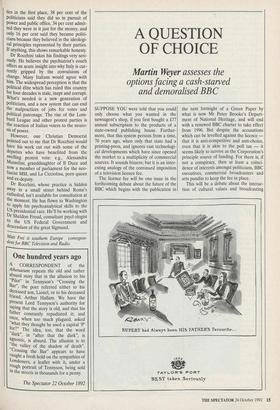DOCTOR IN THE CHAMBER
Matt Frei reports on the
couch confessions of Italy's increasingly neurotic politicians
Rome UNTIL HE WAS sacked on 22 April this year, Dr Piero Rocchini rejoiced in the title of 'Health Consultant for Clinical Psy- chology to the Italian Chamber of Deputies'. Dr Rocchini, who is 42 years old and has a dense beard and glasses with thick lenses, worked for ten years as a member of the medical staff who ensure that Italy's parliamentarians are in good shape to represent the needs and wishes of the people who elect them. The medical and psychological care is free of charge, a service provided by the taxpayer.
Having listened to the fears, dreams and desires of over 200 MPs who sought the solace of his couch, Piero Rocchini became deeply anxious. What he found was a parliament on the edge of a nervous breakdown: tired deputies unable to carry out their duties because they kept waking up at night in a cold sweat, an increasing number of politicians suffering persecution complexes, cyclic depression, nervous rash- es and chain-smoking. Tranquillisers have become the most popular item sold over the counter at the parliament's own chemist.
Dr Rocchini has never revealed the names of his clients. But in April he pub-
lished their symptoms in an article, an act of indiscretion which incurred the wrath of his patients and led to his dismissal. Now he has written a book, Le Nevrosi del potere, 'The Neurosis of Power', launched last week at the Albergo Nationale, a hotel situated opposite the Palazzo Mon- tecitorio, the parliament. As it happens, there were several politicians amongst the guests. In fact, most of the deputies have remained on the doctor's register, unwill- ing to get off the accustomed couch after so many years.
Dr Rocchini's surgery always tends to get crowded during election campaigns, but in the weeks before this year's spring elections the parliamentary shrink was in greater demand than ever. The deputies' anxieties were justified: the Christian Democrats and the Socialists, the parties that have exercised an almost divine right of rule for decades, suffered their worst ever loss of votes. According to Dr Roc- chini's diagnosis, this reflected the break- down of communications between the politicians and the people they represent, a view shared by most political analysts in this country.
While the umbilical cord between the elector and the elected was being severed,
'I ordered a tuna bap!'
another emotional tie was getting stronger. The patients' energies were concentrated to an unhealthy degree on the relationship with their party. This has given rise to what Dr Rocchini calls (in all seriousness) the 'Party Mamma Syndrome' — the party as ersatz mother. The doctor writes that 'the party has become a perverse place, which allows the deputy to play out his private political fantasies'. Devotion to the party is so great that it overshadows any other affil- iation. In political terms, this Oedipus com- plex is seen by the opponents of Italy's 'partitocrazia' as one reason why the all- powerful parties have become corrupt and have lost touch with those voters who don't owe their job to the party. But the party isn't just mamma. She is also lover and an increasingly treacherous one at that, thanks to an electoral law that was passed two years ago. This produced the so-called 'Single Preference Syndrome', perhaps the only time in the history of Psy- chology that an electoral law has created a neurosis. The law abolished the system whereby voters were allowed to list four preferred candidates from one party. Now they can only list one. The struggle to be `numero uno' led to even greater bouts of jealousy, infighting, intrigue and backstab- bing between those deputies who were nur- tured, as it were, by the same mamma. In a survey conducted recently by the Centre for Socio-Psychological Studies amongst 250 politicians from five Italian cities, it emerged that the interviewees feared theiT own parties almost as much as the opposi-
tion. British Conservatives take note. .
But by far the most serious psychological disorder currently afflicting the Italian. Chamber of Deputies is the so-called `131 Pietro Syndrome'. Antonio Di Pietro is the crusading Milan magistrate who has uncov- ered an oil slick of political corruption spreading across Italy. Since 27 February, national deputies and senators, including several ex-ministers, have been investigated for 'misuse of party funds', which means taking bribes. Another 150 local politicians, who do not enjoy parliamentary immunItY, are also subject to Mr Di Pietro's scrutiny.. For the first time in Italy's post-war trad!- tion of political corruption, the evidence is flooding in and being used against the accused in court. Dr Rocchini says this has increased his work load. One deputy, the Socialist Sergio Moroni, resorted to suicide as the only way out.of his humiliation. Since then a collective nightmare has been keeping parliament awake. 'My patients began to have a recur- ring dream,' Dr Rocchini says. `TheY re locked in a house at night. The door sud- denly opens and there's a policeman walt- ing outside with a pair of handcuffs.' The dreams are remarkably lifelike and prophetic. Perhaps the dreams stem from a op, complex, whose origins may be explamea by the findings of the above-mentioned sur- vey. Asked why they wanted to go into poll-
tics in the first place, 38 per cent of the Politicians said they did so in pursuit of Power and public office, 34 per cent admit- ted they were in it just for the money, and only 16 per cent said they became politi- cians because they believed in the ideologi- cal principles represented by their parties. If anything, this shows remarkable honesty.
Dr Rocchini takes his findings very seri- ously. He believes the psychiatrist's couch Offers an acute insight into why Italy is cur- rently gripped by the convulsions of Change. Many Italians would agree with him. The widespread perception is that the Political elite which has ruled this country for four decades is stale, inept and corrupt. What's needed is a new generation of Politicians, and a new system that can end the malpractices of jobs for votes and Political patronage. The rise of the Lom- bard League and other protest parties is the reaction of Italian voters to the neuro- sis of power.
However, one Christian Democrat Pointed out to me that Dr Rocchini would have his work cut out with some of the deputies who have benefited from the swelling protest vote: e.g., Alessandra Mussolini, granddaughter of Ii Duce and now a member of parliament for the neo- fascist MSI, and La Cicciolina, porn queen and ex-deputy. Dr Rocchini, whose practice is hidden away in a small street behind Rome's cathedral, isn't available for consultation at the moment. He has flown to Washington to apply his psychoanalytical skills to the US presidential race. He'll be working with Dr Sheldon Freud, consultant psyci ologist to the US Federal Government and descendant of the great Sigmund.
Matt Frei is southern Europe correspon- dent for BBC Television and Radio.



































































 Previous page
Previous page